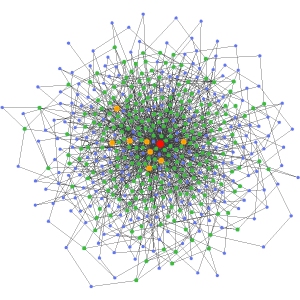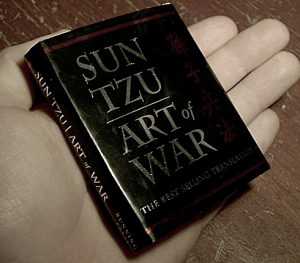Something that was so telling to me, in the Frontline documentary “Generation Like”, was when the book The Art of War was shown during the Kiip section. Although this book was written on strategies during war, the business world easily adopted its theories and concepts to be applicable for business strategy. The question I have, though, is who is the enemy at Kiip?
If Marshall McLuhan had lived to see the Internet, in its current state, I don’t think it would surprise him. To have this much networking power, and it not be used to market to anyone within arm’s reach, would be foolish, from a strategic point of view. Does that mean it’s right? No.
But is it really so different than when cigarette companies were using cartoon images in their magazine advertisements in order to attract a younger consumer to their product? I think, with any new media tool, we will always have this ethical dilemma, deciding whether using it is being manipulative or not. It seems to me that the tool always ends up targeting our most vulnerable consumers: children.
Thankfully, I’m well beyond the age that I need constant approval from my peers about things I “like”. But, I do remember that age, where others’ opinions affect feelings of self-worth. I feel sorry for kids today because they seem to constantly be “on”, proving to themselves that they are popular. They can’t get a break, or vacation, from the job of people pleasing.During the video, a group of kids were sitting around a dining room table, almost as if they were in a board meeting. It’s like this has turned into their full-time job, marketing themselves to their peers.
 Even worse though, it seems their popularity is now dependent on the entire country (or world, really), rather than just the kids in their school. In the Shirky chapter “Fitting our Tools to a Small World”, the concept of loose and tight-fitted groups is discussed. Social media websites, such as Facebook, relied on such groups to be successful. A witty comment, or link to a common interest, on a friend’s page may elicit friend requests from people that have never been met.
Even worse though, it seems their popularity is now dependent on the entire country (or world, really), rather than just the kids in their school. In the Shirky chapter “Fitting our Tools to a Small World”, the concept of loose and tight-fitted groups is discussed. Social media websites, such as Facebook, relied on such groups to be successful. A witty comment, or link to a common interest, on a friend’s page may elicit friend requests from people that have never been met.
Then, a posting on that new friend’s page may elicit a request from friends of theirs’.It is the same concept as the previous Shirky chapter “It Takes a Village to Find a Phone”, where Evan Guttman tracked down his friend Ivana’s phone, except these teens and tweens are passing along the message of their “brand”, or their created identity. In fact, isn’t this the very concept that the Internet is based on?
The Small World Network has been equally successful on YouTube, however, the highly connected people have managed to use their connections to form a business model. While it appears that the highly connected people are gaining popularity because of their uniqueness, personality or daring behavior, I think they end up losing credibility when they “sell out” to sponsors.
The whole reason other kids, or adults, have flocked to them is lost once they start basing their content decisions on what their sponsors want, rather than their audience. Although, it seems that finding sponsors was their initial goal so, in that way, I do admire their entrepreneurial skills.
Reluctantly, I admit I am one of the “older folks”. I don’t have a Facebook or participate in social media, aside from this course. I did have a Facebook account, many years ago, and I can remember the people that really worked their accounts hard. They were constantly online, posting comments and pictures about mundane things, such as, “Look at the scrambled eggs I just made the kids for breakfast. Doesn’t it look delicious?”.
These postings, from people well beyond their teenage years, is exactly why I deleted my account. And, honestly, the things I’ve learned in this course have only reconfirmed that I made a wise choice. But, as they said on Seinfeld, “not that there’s anything wrong with that”. 🙂 
I also find that “likes” are quite misleading. So what if 10,000 people “like” a product if 20,000 dislike it? We have no way of knowing about the negative opinions. At one point, Facebook considered adding a “dislike” button, but only to certain areas. They definitely weren’t going to allow people to “dislike” a company that was paying them for advertising.
And, if a company or product is acquiring those “likes” by offering something for free, it also discredits the measurement. How do these people know if they like the product before they try it? In my opinion, “likes” is not a measurement of quality in any way, shape or form. It displays who has spent more money on marketing. These companies purchased their “likes”.
I finished the material this week and was very thankful to not have been a child during this period. These kids have to worry about their image on a much larger level than I could ever have imagined. A negative comment from a peer, which has always been devastating, is devastating multiplied by thousands. I will be holding out on allowing my children to create social media profiles for as long as I can. I want them to build their sense of self-worth based on their personality, character and skills, not on how many people approve of a single comment or picture.

Love this post! Totally felt the same way about how hard it was to be a teen before and how glad I am to not be a teen now. Also made me worried for my daughter. She is 11 and already desperately wanting to be on social media. The only one I have allowed so far is Pinterest, and we don’t plan on letting her have any others for quite some time.
Also liked the part on the likes being misleading, because there is no dislike or because some are basically paid for.
You did an excellent job tying the readings into the documentary as well. Great job!
Great post. I’m in agreement on hard it is to be a child today with so much pressure groom social media and the attention seeking behavior of the need to be liked. Not just this apply to children but adults who felt rejected as a child and still need to be validated by others pertaining to areas of self worth. I have taught my children to value themselves and never forget who they are but it seems as if social media and the need to be liked by unrealistic friends have taken a hold over them or at least one. With the educational institutions introducing them to social media from the start of kindergarten this generation is pretty much set up to be defiant towards what’s taught at home compared to social pressures. Well done.
I really liked all the pictures you put in this post! It was nice to read about a perspective very different from mine. You talk about how you don’t have a Facebook account, and I am sitting on my chair logged onto different social media on my phone and laptop.
I do agree that likes can be misleading. Though there is a like and dislike button on YouTube, on Facebook and many other media there is no dislike button. I think that is a good thing for now.
Great post!
I agree that kids growing up with social media have it hard! I couldn’t imagine having Facebook around whenever I was in high school. You’d have to worry why you didn’t have so many friends or get so many likes, I just don’t think their maturity levels would be able to comprehend that! It’s pretty sad. I never really thought about the cigarette and cartoon idea. It’s totally relatable to how the internet’s marketing has crossed the line. This course has offered so much information on where the internet is heading and how the marketing can be curbed. I just have no idea where it’s going to go. I’m curious! Just watching and waiting!